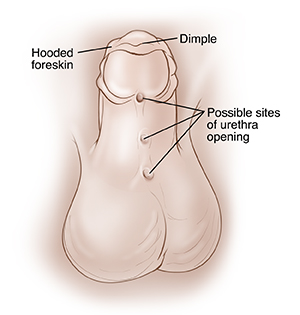When Your Child Has Hypospadias
Your baby has been diagnosed with hypospadias. This is an issue with the penis. About 5 in every 1,000 males born in the U.S. each year have this condition. Hypospadias can range from minor to severe. This sheet tells you more about your child’s condition.
How to say it
hi-puh-SPAY-dee-uhs
What is hypospadias?
The tube that carries urine and sperm out of the body is called the urethra. It runs inside the penis and normally opens at the tip of the penis. With hypospadias, the opening of the urethra is on the underside of the penis instead. The opening may be down near the scrotum. Or it may be between the scrotum and the anus.
 |
| Normally, the opening of the urethral meatus is located at the tip of the penis. |
 |
| With hypospadias, the opening of the urethra is located on the underside of the penis or near the scrotum. |
What causes hypospadias?
Hypospadias is something a child is born with (congenital condition). In most cases, the cause is unknown.
What are the signs of hypospadias?
A child with hypospadias has a urethra that doesn't open at the tip of the penis. They may also have these symptoms:
How is hypospadias diagnosed?
Hypospadias may be seen at your newborn’s physical exam.
How is hypospadias treated?
In mild cases, the urethra may not need correction. In moderate to severe cases, your child may need surgery to correct how the penis looks. Children with hypospadias may not be circumcised as newborns. This is so the foreskin can be used to repair the urethra in the future. The repair surgery is often done when the child is 3 to 18 months old. During surgery, the penis is straightened if needed. Some children may need more than one surgery.
What are the long-term concerns?
Left untreated, mild hypospadias often carries no long-term problems. But in more serious cases, it can be hard for the child to urinate normally. They may need to sit down to urinate. In severe cases, an adult with untreated hypospadias may have trouble delivering sperm and getting a woman pregnant.